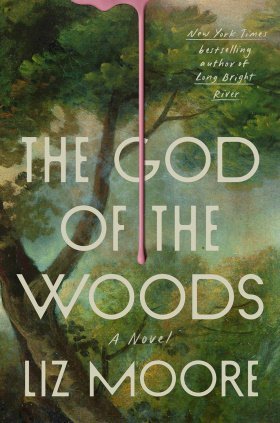“Want me to kill him?” said T.J., and Louise grinned, and then flinched in pain.
Abruptly, T.J. walked down the hallway, and Louise wondered whether she was going to bed. But a moment later she returned, holding something out to her. A large photograph, unframed.
Louise had to hold her eye open with two fingers to inspect it. It was a photo of a group of people, standing on the lake side of Self-Reliance, organized in three rows. In the front row, sitting, were children of various ages; behind them were adults. Their expressions were joyful. The photographer had captured them in various stages of talking and laughing and turning. Only some of them were grinning at the camera.
Louise turned the photograph over. On the back, written in black ink: Blackfly Good-by. 1961.
She looked up at T.J., uncertain.
T.J. sat down next to her on the couch. Regarded the photo alongside her. She pointed to a tall slim girl, twelve or thirteen, standing at the edge of the second row.
“That’s me,” said T.J. “I was about the age your campers are now.”
She pointed to the tall man next to her, who had a hand on her shoulder. “That’s my dad,” she said.
“He looks nice,” said Louise.
“Nice isn’t the right word,” said T.J. “But he’s good.”
Then she moved her finger down on the photograph, to a boy of ten or so, sitting cross-legged on the ground in the front row. He was blond, and grinning impishly, one shoulder angled lower than the other.
“Recognize him?” she said.
Louise did, vaguely, but she didn’t know why.
“That’s your boyfriend,” said T.J.
Louise inclined her head. Spread open the swollen eyelid. Her eye was tearing now. She was trying to find an angle that would let her see more clearly.
Sure enough: that was John Paul. She’d seen a picture of him at that age, on the desk of his room at Union College. In the picture he’d been standing with another boy. She had only asked him about it once, and he’d brushed it off. “An old friend,” he’d said.
“John Paul McLellan,” said T.J. now. Pondering something, it sounded like. Remembering something—unpleasant.
“How did you know he was my boyfriend?” Louise asked.
“How do you think you got this job?” T.J. said.
That quieted her for a bit. She didn’t like to think of herself as someone with connections. Everything she’d ever gotten, she’d earned for herself—until she met John Paul.
“I always hated him,” said T.J. “Wasn’t my choice to hire you. It was the family’s.”
Then she stood up abruptly and walked again down the hallway. Only this time she did not return.
• • •
Louise set the picture on the low table in front of her. Thought for a bit.
A moment later she picked it up again.
1961, said the writing on the back: that would have been the year the Van Laars’ son went missing.
She inspected the picture more carefully. There were twelve people in the back row; fourteen in the middle row, including T.J. and her father standing off to one side; and ten in the front row of children seated on the ground. On one side of John Paul was a girl who was most likely his sister, Marnie, a frown on her face, annoyed by something—the same expression she’d worn when Louise came to dinner.
But on the other side of John Paul was something more interesting: a little boy was there, just a bit younger than John Paul. Eight or so. He was smiling broadly, had both arms in the air. A woman in the row behind him—his mother, Louise assumed—was clutching his hands and smiling down at him, her head lowered in his direction.
She recognized him, suddenly, in two separate ways.
This was the boy in the picture on John Paul’s desk. An old friend, he had said. He wouldn’t tell her more.
This was Bear Van Laar, the family’s missing son, the subject of so many whispered stories at Camp Emerson. She had never seen a picture of him.
The fire behind her cracked loudly, and she jumped.
• • •
In the morning, she woke to find the photo gone, and her host holding out the telephone to her.
“What time is it?” Louise asked.
“Ten thirty. You slept well.”
“Shit,” said Louise. “Shit.”
She was due back at the Garnet Hill Lodge by noon. She still had the staff car—which had no gas in it.
Louise jumped up, wincing. She began feeling for her boots.
“Louise,” said T.J., calmly. “Think a minute.”

























